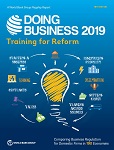Overview
Doing Business 2019: Training for Reform, a World Bank Group flagship publication, is the 16th in a series of annual reports measuring the regulations that enhance business activity and those that constrain it. Doing Business presents quantitative indicators on business regulations and the protection of property rights that can be compared across 190 economies—from Afghanistan to Zimbabwe—and over time.
Doing Business measures regulations affecting 11 areas of the life of a business. Ten of these areas are included in this year’s ranking on the ease of doing business: starting a business, dealing with construction permits, getting electricity, registering property, getting credit, protecting minority investors, paying taxes, trading across borders, enforcing contracts and resolving insolvency. Doing Business also measures labor market regulation, which is not included in this year’s ranking.
Data in Doing Business 2019 are current as of May 1, 2018. The indicators are used to analyze economic outcomes and identify what reforms of business regulation have worked, where and why.
Main findings
- Doing Business captured a record 314 regulatory reforms between June 2, 2017, and May 1, 2018. Worldwide, 128 economies introduced substantial regulatory improvements making it easier to do business in all areas measured by Doing Business.
- The economies with the most notable improvement in Doing Business 2019 are Afghanistan, Djibouti, China, Azerbaijan, India, Togo, Kenya, Côte d’Ivoire, Turkey and Rwanda.
- One-third of all business regulatory reforms recorded by Doing Business 2019 were in the economies of Sub-Saharan Africa. With a total of 107 reforms, Sub-Saharan Africa once again has a record number this year.
- The BRIC economies—Brazil, the Russian Federation, India and China—introduced a total of 21 reforms, with getting electricity and trading across borders the most common areas of improvement.
- The 10 top economies in the ease of doing business ranking share common features of regulatory efficiency and quality, including mandatory inspections during construction, automated tools used by distribution utilities to restore service during power outages, strong safeguards available to creditors in insolvency proceedings and automated specialized commercial courts.
- Training opportunities for service providers and users are positively associated with the ease of doing business score. Similarly, increased public-private communication on legislative changes and processes affecting SMEs are associated with more reforms and better performance on the Doing Business indicators.

